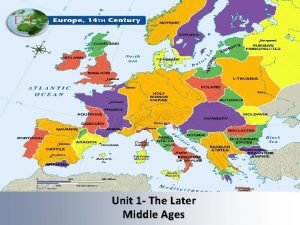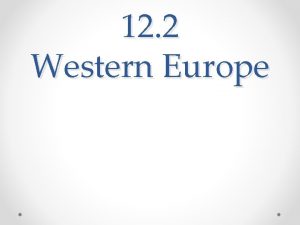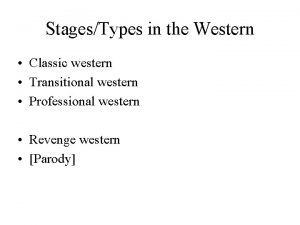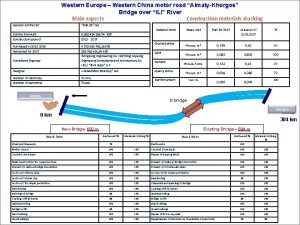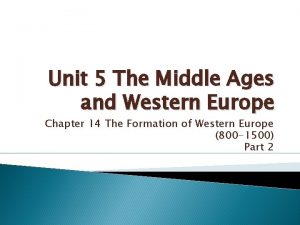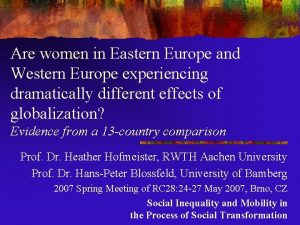Middle Class Fortunes in Western Europe and the





































- Slides: 37

Middle Class Fortunes in Western Europe and the U. S. Rakesh Kochhar Associate Director, Research April 27, 2017

Global Population by Income (%) Source: Pew Research Center analysis of data from the World Bank Povcal. Net database (Center for Global Development version available on the Harvard Dataverse Network) and the Cross-National Data Center in Luxembourg (LIS) April 27, 2017 www. pewresearch. org 2

Share of Americans Who Are Middle Income is Falling % of adults in each income tier Lower Middle Upper 2015 29 50 21 2011 29 51 20 2001 28 54 18 1991 27 56 17 1981 26 59 15 1971 25 61 14 Note: Adults are assigned to income tiers based on their size-adjusted gross household income in the calendar year prior to the survey year. Figures may not add to 100% due to rounding. Source: Pew Research Center analysis of the Current Population Survey, Annual Social and Economic Supplements. April 27, 2017 www. pewresearch. org 3

Middle-class Areas Were More Likely to Move Away from Democrats in 2016 Change in Democratic share of the presidential vote, 2008 - 2016 Note: Middle-income adults live in households with incomes two-thirds to double the national median size-adjusted household income. Incomes in each metropolitan area are adjusted for the cost of living in the area relative to the national average cost of living. Source: Pew Research Center analysis of 2014 American Community Survey (IPUMS) data and county-level election returns. April 27, 2017 www. pewresearch. org 4

The Middle Class: Why Does it Matter? • Emergence from poverty or near poverty • A more equal and economically mobile society • A boost for overall economic growth • Economic equality and opportunity = less political polarization? April 27, 2017 www. pewresearch. org 5

CONCEPTS April 27, 2017 www. pewresearch. org 6

What is the Middle Class? • Self-identified: You are middle class if you say you are • Sociological: A construct based on values (political, cultural, etc. ) and socioeconomic status (income, education, occupation, etc. ) • Economic: Income, consumption or wealth ØMiddle income April 27, 2017 www. pewresearch. org 7

Middle Income: Two Potential Economic Standards • Absolute: A fixed range of income o Same boundaries across countries and time o Unambiguous comparisons across countries and time o Simple way to measure progress • Relative: Income relative to a national norm o Middle-income boundaries are flexible and change over time o Better for analyses of single countries or for countries at similar stages of development April 27, 2017 www. pewresearch. org 8

Income Distributions in India and the U. S. Share of population that lives on a given level of income or consumption 35 % Incomes are daily per capita incomes in 2011, in 2011 prices and purchasing power parities 30 India, Median = $2. 96 25 20 15 10 5 U. S. , Median = $56. 44 0 $0 20 40 60 80 100 120 140 160 180 200 Source: Pew Research Center analysis of data from the World Bank Povcal. Net database (Center for Global Development version available on the Harvard Dataverse Network) and the Cross-National Data Center in Luxembourg (LIS) April 27, 2017 www. pewresearch. org 9

Income Distributions in Denmark and the U. S. Share of population that lives on a given level of income Disposable household incomes are for 2010, scaled to a household size of three, and expressed in 2011 prices and purchasing power parities Median = $43, 156 Median = $52, 941 Source: Pew Research Center analysis of data from the Cross-National Data Center in Luxembourg (LIS) April 27, 2017 www. pewresearch. org 10

What Americans Think is Needed for a Middle-class Lifestyle Depends on Their Income Question: Just your best guess: How much does a family of four need to have in total annual income to lead a middle-class lifestyle in your area? $100, 000 $80, 000 $70, 000 00 K 0 K + $1 $1 5 0 K -$ 15 0 K $7 5 K- $1 0 75 K 0 K -$ $5 0 K -$ $4 40 K 0 K -$ $3 30 K 0 K -$ $2 $1 0 K -$ 20 K 00 0, 0 $1 LT 50 K $50, 000 $45, 000 Respondent’s Family Income Note: Based on respondents who answered the question (N = 2, 005 adults) Source: Pew Research Center survey conducted from Jan. 24 through Feb. 19, 2008 April 27, 2017 www. pewresearch. org 11

METHODOLOGY April 27, 2017 www. pewresearch. org 12

Methodology: Data, Countries, Etc. • Coverage: 11 countries from Western Europe and the U. S. ; selection based on availability of data for around 1990, 2000, 2010 and 2013 • Data: Cross-national Data Center in Luxembourg (LIS) • Income: Adjusted for household size; scaled to threeperson household; expressed in 2011 prices and purchasing power parities • Projections: For some countries, the 1991 income estimates are projections from following survey years: Denmark - 1992, France - 1989, Germany - 1989, Ireland - 1987, Netherlands - 1993, Spain - 1990. April 27, 2017 www. pewresearch. org 13

Methodology: Who is Middle-income? • Middle-class or middle-income adults live in households with incomes ranging from two-thirds to double the national median household income • Income measure used is disposable household income • Middle-income boundaries vary across countries, based on each country’s median disposable household income • Alternatives tested: Ø Ø Gross household income U. S. median household income • Previous Pew Research Center analyses for the U. S. are based on gross household income April 27, 2017 www. pewresearch. org 14

What it Takes to be Middle Income Varies by Country: Part 1 Middle-income range in 2010 for a three-person household, in 2011 prices and purchasing power parity dollars Note: Middle-income households have disposable incomes that are two-thirds to double the national median disposable income, after incomes have been adjusted for household size. Source: Pew Research Center analysis of data from the Cross-National Data Center in Luxembourg (LIS). April 27, 2017 www. pewresearch. org 15

What it Takes to be Middle Income Varies by Country: Part 2 Middle-income range in 2010 for a three-person household, in 2011 prices and purchasing power parity dollars Note: Middle-income households have disposable incomes that are two-thirds to double the national median disposable income, after incomes have been adjusted for household size. Source: Pew Research Center analysis of data from the Cross-National Data Center in Luxembourg (LIS). April 27, 2017 www. pewresearch. org 16

Who is Middle Income or Upper Income? The U. S. Example Minimum 2010 disposable household income, in 2011 prices, needed to qualify for middle- and upper-income tiers, by household size Source: Pew Research Center analysis of data from the Cross-National Data Center in Luxembourg (LIS) April 27, 2017 www. pewresearch. org 17

What it Takes to be Middle Income Changes Over Time Middle-income range in the U. S. for a three-person household Note: Incomes are disposable household incomes expressed in 2011 prices. Source: Pew Research Center analysis of data from the Cross-National Data Center in Luxembourg (LIS). April 27, 2017 www. pewresearch. org 18

THE MIDDLE CLASSES April 27, 2017 www. pewresearch. org 19

Middle-class Shares in Western Europe are Larger than in the U. S. % of adult population in lower-, middle- and upper-income households, 2010 Note: Middle-income households have disposable incomes that are two-thirds to double the national median disposable income, after incomes have been adjusted for household size. Source: Pew Research Center analysis of data from the Cross-National Data Center in Luxembourg (LIS). April 27, 2017 www. pewresearch. org 20

Middle-class Shares are Falling in Majority of Countries… % of adults living in middle-income households in 1991 and 2010 Note: Middle-income households have disposable incomes that are two-thirds to double the national median disposable income, after incomes have been adjusted for household size. For some countries the 1991 estimates are from the following survey years: Denmark 1992, France - 1989, Germany - 1989, Ireland - 1987, Netherlands - 1993, Spain - 1990. Source: Pew Research Center analysis of data from the Cross-National Data Center in Luxembourg (LIS). April 27, 2017 www. pewresearch. org 21

…and Lower- and Upper-income Shares are Increasing in Many Countries % point change in shares of adults in lower-, middle- and upper-income tiers, 1991 to 2010 Note: For some countries the 1991 estimates are from the following survey years: Denmark - 1992, France - 1989, Germany 1989, Ireland - 1987, Netherlands - 1993, Spain - 1990. Source: Pew Research Center analysis of data from the Cross-National Data Center in Luxembourg (LIS). April 27, 2017 www. pewresearch. org 22

Overall, There is More Movement Up the Income Ladder than Downward in Most Countries Change in the share of adults in upper-income households minus the change in the share in lower-income households (percentage point change), 1991 to 2010 Note: For some countries the 1991 estimates are from the following survey years: Denmark - 1992, France - 1989, Germany 1989, Ireland - 1987, Netherlands - 1993, Spain - 1990. Source: Pew Research Center analysis of data from the Cross-National Data Center in Luxembourg (LIS). April 27, 2017 www. pewresearch. org 23

INCOMES April 27, 2017 www. pewresearch. org 24

Luxembourg Households Have the Highest Incomes, Followed by Those of U. S. National median disposable household income in 2010 for a three-person household, in 2011 prices and purchasing power parity dollars Source: Pew Research Center analysis of data from the Cross-National Data Center in Luxembourg (LIS). April 27, 2017 www. pewresearch. org 25

Share of Middle-income Adults Rises with National Household Income; U. S. Appears an Exception Note: Middle-income households have disposable incomes that are two-thirds to double the national median disposable income, after incomes have been adjusted for household size. Disposable incomes are expressed in 2011 prices and purchasing power parity dollars. Source: Pew Research Center analysis of data from the Cross-National Data Center in Luxembourg (LIS). April 27, 2017 www. pewresearch. org 26

Household Incomes in Most Western European Countries Rose Faster than in the U. S. from 1991 to 2010 National median disposable household income scaled to reflect a three-person household, in 2011 prices and purchasing power parity dollars Note: The survey dates for some countries differ slightly from the dates shown as follows: Denmark - 1992, France - 1989, Germany 1989, Ireland - 1987, Netherlands - 1993, and Spain - 1990. Incomes for these countries are projected to 1991. Source: Pew Research Center analysis of data from the Cross-National Data Center in Luxembourg (LIS). April 27, 2017 www. pewresearch. org 27

All Income Tiers in Majority of Western European Countries are Catching up to the U. S. in their Standard of Living % change in median disposable household income, 1991 to 2010, by income tier Note: Incomes are first adjusted for household size and expressed in 2011 prices and purchasing power parities. For some countries the 1991 estimates are from the following survey years: Denmark - 1992, France - 1989, Germany - 1989, Ireland - 1987, Netherlands - 1993, Spain - 1990. Incomes for these countries are projected to 1991. Source: Pew Research Center analysis of data from the Cross-National Data Center in Luxembourg (LIS). April 27, 2017 www. pewresearch. org 28

Countries with Higher Income Inequality Have Smaller Shares of Adults who are Middle-income Source: Pew Research Center analysis of data from the Cross-National Data Center in Luxembourg (LIS). April 27, 2017 www. pewresearch. org 29

INCOME DISTRIBUTIONS April 27, 2017 www. pewresearch. org 30

Income Distributions in Western European Countries and the U. S. (Part 1) % of adults with a given level of disposable household income in 2010 Note: Incomes are adjusted for household size, scaled to reflect a household of three, and expressed in 2011 prices and purchasing power parities. Source: Pew Research Center analysis of data from the Cross-National Data Center in Luxembourg (LIS). April 27, 2017 www. pewresearch. org 31

Income Distributions in Western European Countries and the U. S. (Part 2) % of adults with a given level of disposable household income in 2010 Note: Incomes are adjusted for household size, scaled to reflect a household of three, and expressed in 2011 prices and purchasing power parities. Source: Pew Research Center analysis of data from the Cross-National Data Center in Luxembourg (LIS). April 27, 2017 www. pewresearch. org 32

Income Distributions in Western European Countries and the U. S. (Part 3) % of adults with a given level of disposable household income in 2010 Note: Incomes are adjusted for household size, scaled to reflect a household of three, and expressed in 2011 prices and purchasing power parities. Source: Pew Research Center analysis of data from the Cross-National Data Center in Luxembourg (LIS). April 27, 2017 www. pewresearch. org 33

ALTERNATIVE STANDARDS April 27, 2017 www. pewresearch. org 34

Larger Shares of Adults are in the Middle Class Based on their Disposable Income Than their Gross income % of adult population in lower-, middle- and upper-income households, 2010 Note: Middle-income households have incomes that are two-thirds to double the national median income, after incomes have been adjusted for household size. France and Italy are not shown because of the lack of data on gross income. Source: Pew Research Center analysis of data from the Cross-National Data Center in Luxembourg (LIS). April 27, 2017 www. pewresearch. org 35

Middle-class Share Decreases in Many Western European Countries When the U. S. Income is Used to Define Tiers % of adult population in lower-, middle- and upper-income households, 2010 The "national income standard" uses each country's own median disposable household income. The "U. S. income standard" uses the median disposable household income in the U. S. after incomes in all countries are expressed in 2011 prices and purchasing power parities. Source: Pew Research Center analysis of data from the Cross-National Data Center in Luxembourg (LIS). April 27, 2017 www. pewresearch. org 36

Rakesh Kochhar Associate Director, Research rkochhar@pewresearch. org @rakeshkochhar April 27, 2017 www. pewresearch. org 37
 Follow the fortunes
Follow the fortunes Differences between western and eastern europe
Differences between western and eastern europe Mount elbrus
Mount elbrus Western europe after the fall of rome
Western europe after the fall of rome Chapter 14 the formation of western europe
Chapter 14 the formation of western europe Chapter 14 the formation of western europe
Chapter 14 the formation of western europe Europe population pyramid
Europe population pyramid Invaders attack western europe
Invaders attack western europe Feudalism
Feudalism Feudal hierarchy titles
Feudal hierarchy titles Western europe hdi
Western europe hdi European middle ages map
European middle ages map Art has been an integral part in european history.
Art has been an integral part in european history. Hát kết hợp bộ gõ cơ thể
Hát kết hợp bộ gõ cơ thể Bổ thể
Bổ thể Tỉ lệ cơ thể trẻ em
Tỉ lệ cơ thể trẻ em Voi kéo gỗ như thế nào
Voi kéo gỗ như thế nào Tư thế worms-breton
Tư thế worms-breton Alleluia hat len nguoi oi
Alleluia hat len nguoi oi Môn thể thao bắt đầu bằng chữ đua
Môn thể thao bắt đầu bằng chữ đua Thế nào là hệ số cao nhất
Thế nào là hệ số cao nhất Các châu lục và đại dương trên thế giới
Các châu lục và đại dương trên thế giới Công thức tính thế năng
Công thức tính thế năng Trời xanh đây là của chúng ta thể thơ
Trời xanh đây là của chúng ta thể thơ Cách giải mật thư tọa độ
Cách giải mật thư tọa độ Phép trừ bù
Phép trừ bù độ dài liên kết
độ dài liên kết Các châu lục và đại dương trên thế giới
Các châu lục và đại dương trên thế giới Thơ thất ngôn tứ tuyệt đường luật
Thơ thất ngôn tứ tuyệt đường luật Quá trình desamine hóa có thể tạo ra
Quá trình desamine hóa có thể tạo ra Một số thể thơ truyền thống
Một số thể thơ truyền thống Cái miệng nó xinh thế
Cái miệng nó xinh thế Vẽ hình chiếu vuông góc của vật thể sau
Vẽ hình chiếu vuông góc của vật thể sau Nguyên nhân của sự mỏi cơ sinh 8
Nguyên nhân của sự mỏi cơ sinh 8 đặc điểm cơ thể của người tối cổ
đặc điểm cơ thể của người tối cổ Thế nào là giọng cùng tên
Thế nào là giọng cùng tên Vẽ hình chiếu đứng bằng cạnh của vật thể
Vẽ hình chiếu đứng bằng cạnh của vật thể











